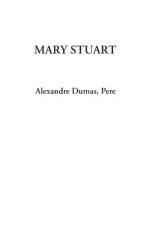“I pardon you, my friend,” said Mary, “and in proof of it, here is my hand to kiss.”
The executioner put his lips to the queen’s hand, rose and approached the chair. Mary sat down, and the Earls of Kent and Shrewsbury standing on her left, the sheriff and his officers before her, Amyas Paulet behind, and outside the barrier the lords, knights, and gentlemen, numbering nearly two hundred and fifty, Robert Beale for the second time read the warrant for execution, and as he was beginning the servants who had been fetched came into the hall and placed themselves behind the scaffold, the men mounted upon a bench put back against the wall, and the women kneeling in front of it; and a little spaniel, of which the queen was very fond, came quietly, as if he feared to be driven away, and lay down near his mistress.
The queen listened to the reading of the warrant without seeming to pay much attention, as if it had concerned someone else, and with a countenance as calm and even as joyous as if it had been a pardon and not a sentence of death; then, when Beale had ended, and having ended, cried in a loud voice, “God save Queen Elizabeth!” to which no one made any response, Mary signed herself with the cross, and, rising without any change of expression, and, on the contrary, lovelier than ever—
“My lords,” said she, “I am a queen-born sovereign princess, and not subject to law,—a near relation of the Queen of England, and her rightful heir; for a long time I have been a prisoner in this country, I have suffered here much tribulation and many evils that no one had the right to inflict, and now, to crown all, I am about to lose my life. Well, my lords, bear witness that I die in the Catholic faith, thanking God for letting me die for His holy cause, and protesting, to-day as every day, in public as in private, that I have never plotted, consented to, nor desired the queen’s death, nor any other thing against her person; but that, on the contrary, I have always loved her, and have always offered her good and reasonable conditions to put an end to the troubles of the kingdom and deliver me from my captivity, without my having ever been honoured with a reply from her; and all this, my lords, you well know. Finally, my enemies have attained their end, which was to put me to death: I do not pardon them less for it than I pardon all those who have attempted anything against me. After my, death, the authors of it will be known. But I die without accusing anyone, for fear the Lord should hear me and avenge me.”
Upon this, whether he was afraid that such a speech by so great a queen should soften the assembly too much, or whether he found that all these words were making too much delay, the Dean of Peterborough placed himself before Mary, and, leaning on the barrier—
“Madam,” he said, “my much honoured mistress has commanded me to come to you—” But at these words, Mary, turning and interrupting him:




